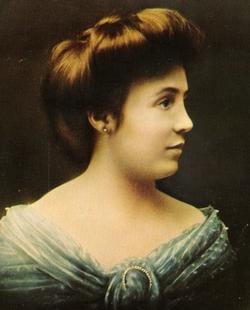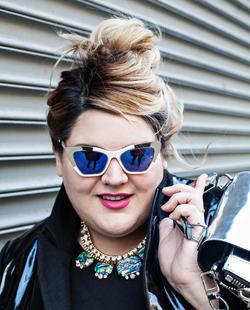Pioneers of Plus Size Clothing
Getting dressed can be frustrating and fraught with emotion, especially for women. What is more demoralizing than a favorite dress failing to zip, or a pair of pants that doesn’t come in the right size? Lena Bryant Malsin and Nicolette Mason have helped women access clothing that fits and makes them feel fabulous, changing women’s relationship with fashion, and by extension, their sense of self.
If you’re feeling low about the progress of women over the past century—frustrated by setbacks, or wondering how much change we’ve really made—consider that in 1904, pregnant women were not to be seen on the street. They were to remain in the home, locked away until after the baby came, lest unassuming passersby be affronted by a person in such an inappropriate state. At a time when women’s bodies were hidden and unacknowledged, it was no coincidence that the woman who pioneered maternity wear also created the first ready-to-wear plus size clothing.
Today, the term “plus size” is a source of conflict and tension—after all, if the average American woman wears a size 14, aren’t “plus size” clothes really standard, not “plus.” Yet until the 1950s, the term “plus size” didn’t exist. When Lena Bryant Malsin began creating clothes for larger women just before World War I, she called them “stout-figured.”
Lena Bryant, born Lena Himmelstein in Lithuania, was a dressmaker who found herself widowed with two young children and opened a shop on 5th Avenue to support her family. She created the first commercially made maternity dresses by incorporating elastic waistbands (thank you, Lena!). Having addressed pregnant women’s needs for fashionable, comfortable clothing that fit their changing bodies, Lena soon moved on to serve another important niche market: women who were too big to fit into the very narrow range of sizes available at the time. Lena wrapped her tape measure around an astounding 4,500 women and gathered data on the busts, waists, hips, and thighs of 200,000 other women. She determined three broad types of “stout” figures, and designed clothes to fit each. Her clothes flew off the racks, proving that there was a market for stylish plus size women’s clothing.
Lena, together with her second husband Albert Malsin, became enormously successful by the 1920s. She went from dressmaker to millionaire with her sense of ethics intact: at her direction, her company Lane Bryant offered pensions, health insurance, and profit–sharing at a time when few other businesses did. She also provided free clothes to any customer who lost their belongings in a disaster, and donated garments to Europeans in need after WWII. Notably, Lena continued to work after she remarried, at a time when many women would have passed the business on to their husbands and gone home to care for their children.
Lena Bryant Malsin’s company was named Lane Bryant when a bank teller misspelled her name, an amusing error considering that the moniker is now the most famous name in plus size fashion. During the first years of the twentieth century, creating a sea change in fashion—and by extension, women’s daily lives—was as simple as recognizing a need and stepping in to fill it. An immigrant, entrepreneur, philanthropist, and inventor, Lena Bryant Malsin deserves to be known for more than her name.
If Lena Bryant’s functional designs allowed women to sigh with relief, Nicolette Mason encourages them to cheer.
A first-generation Jewish American of Iranian descent, Mason grew up in Los Angeles and studied fashion at Parsons The New School for Design in New York City. She interned at Chanel, started her fashion blog in 2008, and in 2011 became a columnist for Marie Claire, writing the magazine’s “Big Girl in a Skinny World” feature. Within a few short years, Mason rose from being just another fashion blogger to the voice of the plus size fashion world.
So how did Mason pull away from the pack and build a brilliant career in an industry that so often ignores and overlooks women of a certain size? Like Lena Bryant Malsin, Mason saw a need and she met it. This time, it was an emotional yearning she filled, as much as she addressed a practical need for clothing: Mason understood before most retailers that women who wore plus size clothing felt alienated, shamed, and ignored. They longed to find clothing that not only fit, but also made them feel sexy, comfortable, and confident. Mason’s work sends the message that women can look beautiful and fashionable regardless of their size, using herself as a model and explaining exactly where to find the clothing she wears with such panache.
Of course, fashionable, well-made plus size clothing has never been easy to find, even for an expert like Mason. As her fame rose, brands like Modcloth and Target approached Mason to collaborate on clothing lines. Mason’s own ideals are reflected in her designs—her Modcloth line ran from size extra small to 4X, emphasizing her appeal to all women, not just shoppers of a certain size.
Mason has never been shy about sharing her ideals and ethos. An advocate for women’s issues around fashion, size, and identity and an outspoken proponent of gay rights, Mason has written beautifully and persuasively about her own struggles with being a size 16 Middle Eastern gay woman in the fashion world. She is an inspiration to the many women who feel pressured to hide their bodies, their identities, and their sexualities.
A century ago, Lena Bryant Malsin’s work let women who couldn’t fit in standard sizes get dressed and walk down the street with confidence, challenging societal norms about what kind of woman should be allowed to present her body outside the home. Today, Nicolette Mason is doing the same thing, convincing women that clothing should be fun and expressive, not oppressive. Horizontal stripes? Crop tops? Neon? Rules be damned; today women of every size can wear what they please, and for that they have two Jewish women from two very different eras to thank.




